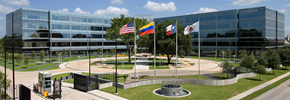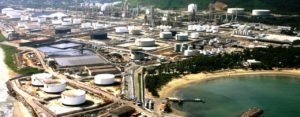
(Citgo, 10.Dec.2020) — NGOs and other private philanthropic groups are increasingly critical in helping address the deteriorating humanitarian crisis in Venezuela, according to three diverse panels of leading experts recently convened in Houston via webinar by the Simón Bolívar Foundation.
Panelists from the international development and humanitarian relief sector pointed out that while the Covid-19 pandemic has devastated Latin America, increasing poverty throughout the region, Venezuela’s suffering is dramatically worse due to the ongoing economic collapse that preceded the Covid-19 outbreak. Hyperinflation, a shattered private sector, dwindling foreign exchange reserves and mass unemployment were all well entrenched prior to the pandemic. Venezuelan households now depend significantly on transfers, and not wages, to meet their basic needs.
Covid-19 is a crisis within Venezuela’s humanitarian crisis. Fourteen million of the country’s 27 million citizens now struggle to meet basic humanitarian needs such as nutrition, health or economic subsistence. 95% of the population in is living in poverty and almost 70% of Venezuelans are experiencing extreme poverty.
5.2 million Venezuelans have left the country, fueling a refugee crisis in neighboring countries. The pandemic has hit Venezuelan refugees hard. Already among the most vulnerable population globally, Covid-19 has severely impacted refugees’ health, social and economic well-being. This has reduced, remittances to Venezuela, today one of the country’s most important sources of income almost equal to oil revenues, long the nation’s economic foundation.
The country’s economic devastation has deepened the food security and public health crises. According to the Food Security Information Network (FSIN) Venezuela was suffering the world’s 4th-worst food crisis – behind only Yemen, Democratic Republic of Congo and Afghanistan – even before the pandemic. Of particular concern were warnings by panelists of severe malnutrition, particularly among mothers and children of 5 years of age or younger, with worrying increases in mortality rates.
Equally concerning were risks outlined by the panelists of vaccination delays this year in Venezuela, which could lead to a surge in other infectious diseases thought to have been eradicated.
The health crisis has been exacerbated by the collapse of the nation’s hospitals and health care infrastructure, the thousands of health care professionals forced to leave the country and the mortality rates of those who have stayed, but do not have minimum protections to combat the surge of Covid-19.
Yet against this dire backdrop, panelists emphasized Venezuela’s woefully inadequate level of humanitarian funding. In 2019 the country could secure only 40% of allocated humanitarian funding; with 2020 actual funding standing at less than 20% of allocated – even as needs have doubled if not tripled. Of the almost $800mn in allocated 2020 funding for Venezuela’s humanitarian response, only $150mn had been disbursed, according to the United Nations Office for the Coordination of Humanitarian Affairs (https://hum-insight.info/plan/928). While the reasons for such low execution are numerous, bureaucratic impediments and unnecessary regulatory obstacles within Venezuela have also contributed to the very low implementation of humanitarian aid.
Panelists strongly underscored the critical importance of humanitarian NGOs, philanthropic groups and international organizations to make up the massive funding and execution gap.
The December 2nd webinar event was convened by the Simón Bolívar Foundation Inc., a 501(c)(3) private foundation founded by Citgo Petroleum Corporation. The Foundation supports initiatives to meet the immediate and long-term health needs of the most vulnerable individuals particularly in and from Venezuela, with a special focus on the health and well-being of children and their mothers.
The full list of expert participants included:
— Dr. Peter Hotez, Dean of the National School of Tropical Medicine and Professor of Pediatrics and Molecular Virology & Microbiology at Baylor College of Medicine
— Dr. Shannon Doocy, Johns Hopkins University Center for Humanitarian Health
— Dr. Norbert Schady, Principal Economic Advisor, Inter-American Development Bank
— Dr. Cynthia Arnson, Director of the Latin American Program, Woodrow Wilson Center
— Dr. Marino Gonzalez, Member of the Medical Academy of Venezuela, Profesor Universidad Simón Bolivar
— Dr. Julio Castro, Professor at Tropical Medicine Institute, Universidad Central de Venezuela, Advisor Health Affairs for the National Assembly
— Susana Raffali, Humanitarian Expert-Advisor, Caritas de Venezuela
— Tamara Herrera, Managing Director and Chief Economist, Sintesis Financiera
— Luis Pedro España, Director of the Poverty Project, Universidad Católica Andres Bello
— Emmanuel Abuelafina, General Coordinator for Venezuela, Inter-American Development Bank
— Maria Moreno, Head of Philanthropy and Private Sector Engagement, USA for IOM, the UN Migration Agency
— Dr. Gloria Mattiuzzi, Co-Founder, President and Director Medical Program, Cuatro por Venezuela
— Feliciano Reyna, Founder and Executive President, Acción Solidaria
Links to video content of the three panel discussions are below:
— Panel 1
— Panel 2
— Panel 3
__________

